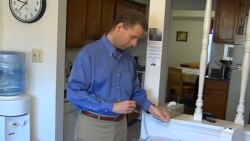WASHINGTON —
Most people with mental illness do not commit violent crimes. But acts of mass violence by apparently deranged young men have focused public attention in the United States on how hard it can be to identify and diagnose people with serious mental illnesses, and to get them effective treatment before they do harm to themselves or others.
Eric Parks and his mother Ginger Smith have shared a long battle with mental illness. Parks has bi-polar disorder. His first psychotic episode happened when he was 19.
"I don’t remember much of it. It was just a bad situation. I didn’t feel very good, that’s for sure," Parks said.
"And that was the beginning, the continuation of years of miserable times for Eric and difficult times for the family," Smith said.
Mental illness can prevent people from thinking rationally. Unless they have professional help, people with severe mental illness cannot stick to a schedule, and they stop taking the medications that can keep them grounded.
Parks' mother tried but failed to have her son hospitalized.
Many hospitals in the U.S. do not treat psychiatric patients. Those that do, often release patients after brief stays without the support of a mental health professional to ensure a stable transition. Discharged patients sometimes lack the money to buy their medicines or to pay for follow-up psychiatric services.
Parks ended up homeless, starving and without medication.
"I wasn’t willing to receive treatment. I wasn’t at a point where I was willing to admit that I had a mental illness or I had to take any medications or anything like that," Parks said.
Improvements in the nation's mental health care system are sorely needed, according to Wayne Lindstrom. He heads Mental Health America, an advocacy group.
"We have a mental health system, and we also have a physical medicine system. And they have not been integrated, typically. And they need to be, desperately, because so many of the problems that children and adults present with cross broad spectrums (of illnesses, and) aren’t separated from the neck up or down," Lindstrom said.
Parks now lives in a private home where the staff manages his medications and helps him structure his day. But such care is costly, and there are no public or private programs to help pay for it. Most families exhaust their savings. Smith sold her home so she could afford to keep her son there. Parks is now well enough that he has begun looking for a job.
"I’d like to eventually get back out on my own and maybe have an apartment and live independently," Parks said.
Parks will need the services of a group home for several more years. Still, Smith points to her son’s accomplishments and bristles at the way people with mental illness are portrayed by public officials and the media.
"If we can shift the perspective to greater understanding and knowledge, and the resources to back it up, we will be taking a great step forward to some of the things that our families live with and many others know very well," Smith said.
Instead, funding for these programs has been cut sharply in recent years.
Eric Parks and his mother Ginger Smith have shared a long battle with mental illness. Parks has bi-polar disorder. His first psychotic episode happened when he was 19.
"I don’t remember much of it. It was just a bad situation. I didn’t feel very good, that’s for sure," Parks said.
"And that was the beginning, the continuation of years of miserable times for Eric and difficult times for the family," Smith said.
Mental illness can prevent people from thinking rationally. Unless they have professional help, people with severe mental illness cannot stick to a schedule, and they stop taking the medications that can keep them grounded.
Parks' mother tried but failed to have her son hospitalized.
Many hospitals in the U.S. do not treat psychiatric patients. Those that do, often release patients after brief stays without the support of a mental health professional to ensure a stable transition. Discharged patients sometimes lack the money to buy their medicines or to pay for follow-up psychiatric services.
Parks ended up homeless, starving and without medication.
"I wasn’t willing to receive treatment. I wasn’t at a point where I was willing to admit that I had a mental illness or I had to take any medications or anything like that," Parks said.
Improvements in the nation's mental health care system are sorely needed, according to Wayne Lindstrom. He heads Mental Health America, an advocacy group.
"We have a mental health system, and we also have a physical medicine system. And they have not been integrated, typically. And they need to be, desperately, because so many of the problems that children and adults present with cross broad spectrums (of illnesses, and) aren’t separated from the neck up or down," Lindstrom said.
Parks now lives in a private home where the staff manages his medications and helps him structure his day. But such care is costly, and there are no public or private programs to help pay for it. Most families exhaust their savings. Smith sold her home so she could afford to keep her son there. Parks is now well enough that he has begun looking for a job.
"I’d like to eventually get back out on my own and maybe have an apartment and live independently," Parks said.
Parks will need the services of a group home for several more years. Still, Smith points to her son’s accomplishments and bristles at the way people with mental illness are portrayed by public officials and the media.
"If we can shift the perspective to greater understanding and knowledge, and the resources to back it up, we will be taking a great step forward to some of the things that our families live with and many others know very well," Smith said.
Instead, funding for these programs has been cut sharply in recent years.








